Author: Cathy Canning
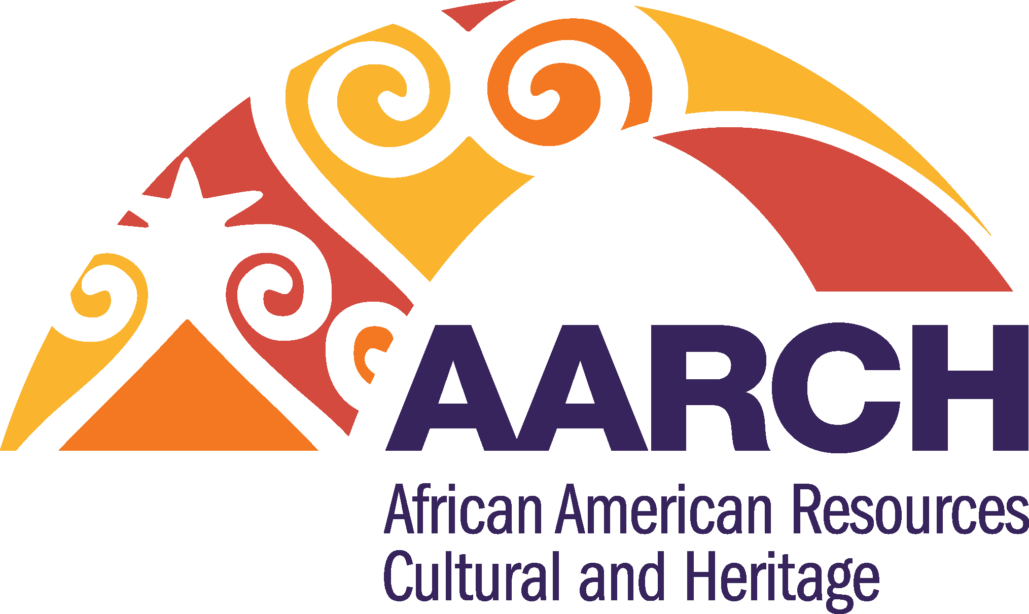
In Memory: Harold Cooper and Ruth Brown
March 11, 2023AARCH Society celebrates lives well lived. Join us as we honor Mr. Harold Cooper, who was featured in “The Tale of the Lion” documentary, and Mrs. Ruth Brown, who appeared in our most recent documentary of Lincoln School, “Back to Our Bygone Days.” 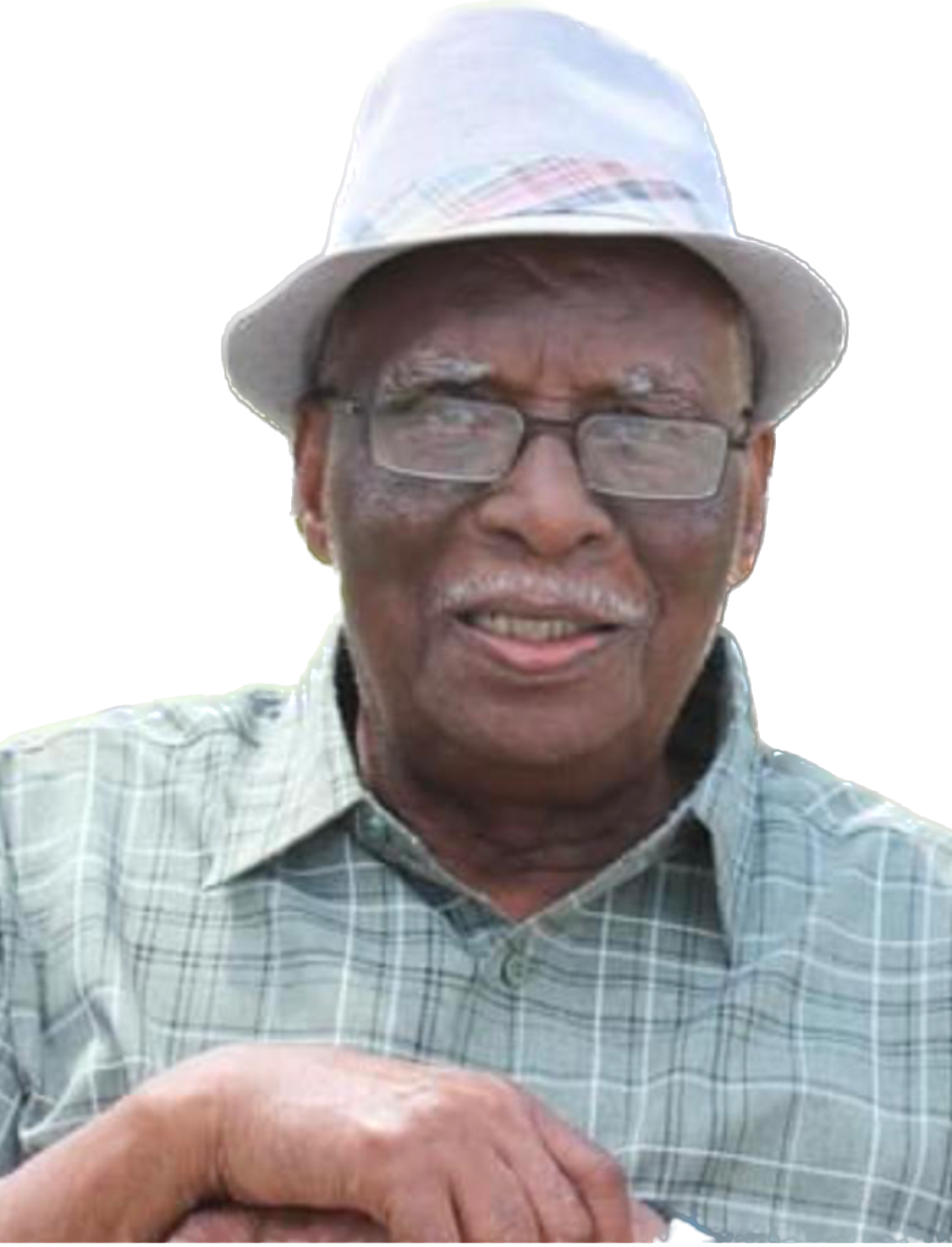
Harold Cooper was born in 1927 in Jacksonville, Fla., and served in the military until 1947. He was employed at the Norfolk Naval Shipyard for 35 years and during that time married Katherine Knight Cooper. In his senior years he moved to Frederick to live closer to family. Mr. Cooper, who would often share his experiences of living in a segregated society, is featured in the opening segment of “The Tale of the Lion.“
Ruth Brown was born in 1929 and in adulthood became affectionately known as Miss Ruthie. She married her high school sweetheart Bernard Brown in 1955 and became an admired classroom teacher, mentor, and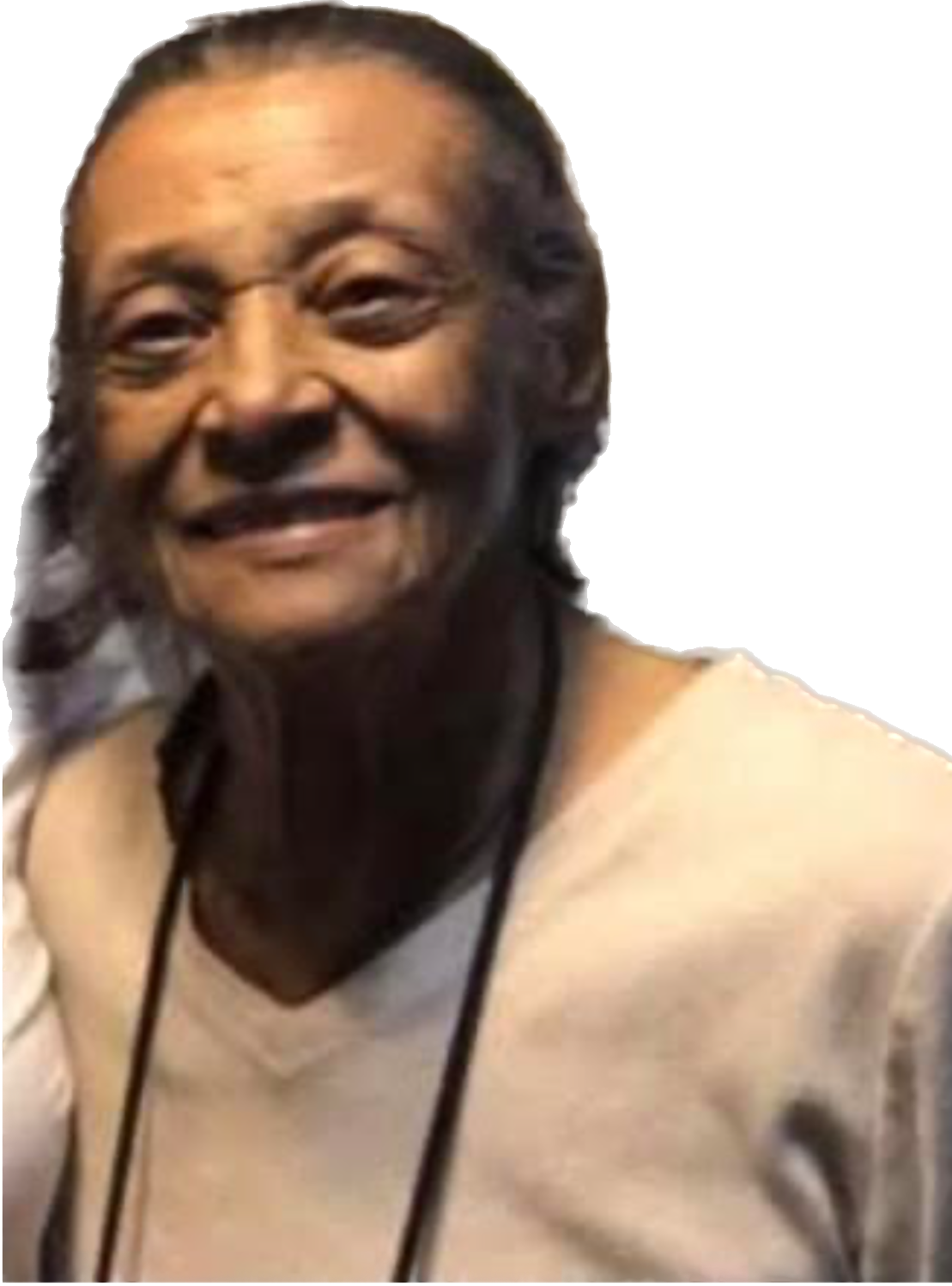 board member of various community organizations. Miss Ruthie was the creator of The Young, Gifted and Black Bernetta R. Brown Dance Troop, named after her only child who died unexpectedly in her late teens. Ruth and her husband both attended the segregated Lincoln School, and they appear together singing the Lincoln School song in the last scene of “Back to Our Bygone Days.”
board member of various community organizations. Miss Ruthie was the creator of The Young, Gifted and Black Bernetta R. Brown Dance Troop, named after her only child who died unexpectedly in her late teens. Ruth and her husband both attended the segregated Lincoln School, and they appear together singing the Lincoln School song in the last scene of “Back to Our Bygone Days.”
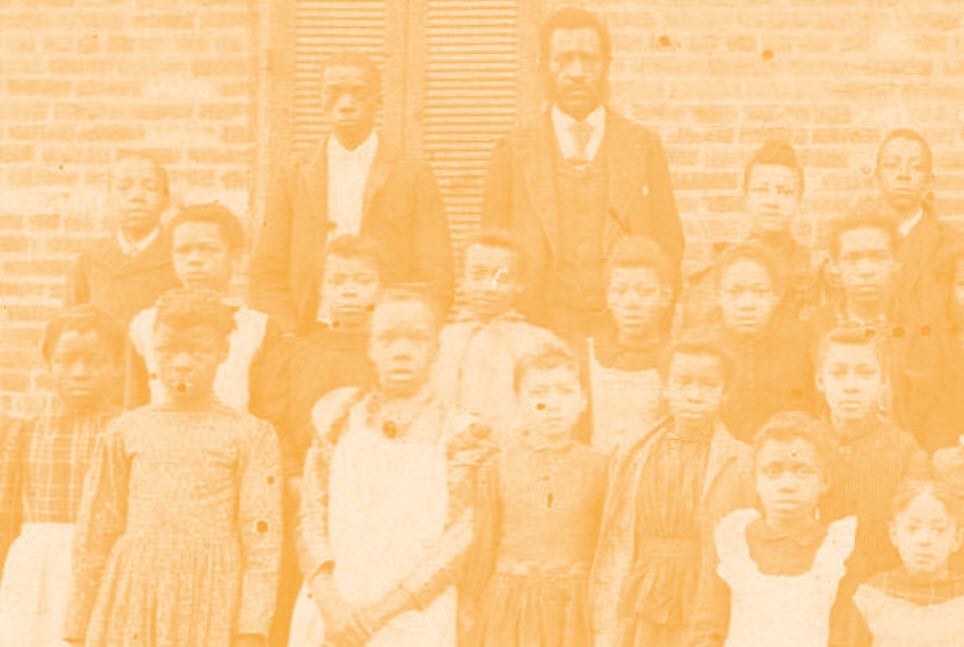
Celebrating Black History Month 2023
March 11, 2023AARCH Society celebrated Black History Month in Frederick, Md., with great events, tributes, and celebrations of our African American history, culture, and contributions. Here are some highlights!
- All month: Items from the AARCH Society Archival Collection filled the entry hall display cases at C. Burr Artz Library, as well as a timeline of notable African American pioneers and ‘firsts’ in Frederick County.
- All month: Yemi’s African Americans of Excellence exhibit appeared at Gaslight Gallery, featuring important members of Frederick County’s African American community, past and present.
- February 7: Board Member Barbara Thompson presented Held in Regard at Walkersville Library, highlighting little-known historical persons, places, and events in the African American community.
- February 12: AARCH Society re-screened “The Tale of the Lion” documentary at C. Burr Artz Library, featuring interviews with some of Frederick County’s oldest African Americans.
- February 23: AARCH President Protean Gibril spoke at Frederick County’s Black History Month Celebration, Black History in the Making, a Special Ceremony.
- February 26: Jackson Chapel United Methodist Church aired AARCH Society’s “Back to Our Bygone Days,” a new documentary featuring recollections from Lincoln School, Frederick County’s first and only secondary school for African Americans until the end of segregation.
- February 28: AARCH Society Vice President Seaven Gordon participated a Moving Us Forward and Maryland Public Television screening and panel discussion of Ric Burns’ “Driving While Black, Race, Space, and Mobility in America” at the Delaplaine Center.
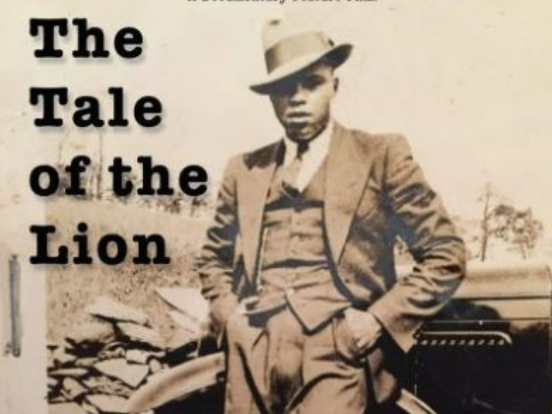
Tale of the Lion Viewing for Black History Month
February 19, 2023Read this feature by The Frederick News Post: “In the years since “The Tale of the Lion: Our Voices, Our Stories” premiered at the Weinberg Center for the Arts in Frederick in 2018, several organizations have requested showings of the documentary, to hear from the people whom Barbara Thompson calls “our living treasures.” Read the full article here.
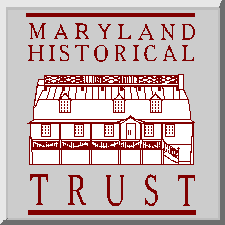
Recovering Identity Grant to Study Local African American History
February 13, 2023See this Frederick News Post article on a new grant and project: “The Maryland Historical Trust has awarded $35,000 to Frederick County for the second phase of a project to study African American history in partnership with the African American Resources Cultural and Heritage (AARCH) Society, according to a press release Monday. The project, called Recovering Identity, will provide research and a foundation for long-term preservation planning for African American resources in Frederick County, the release states.” Read the rest of the article here.
Logo: Fair use, https://en.wikipedia.org/w/index.php?curid=30035419
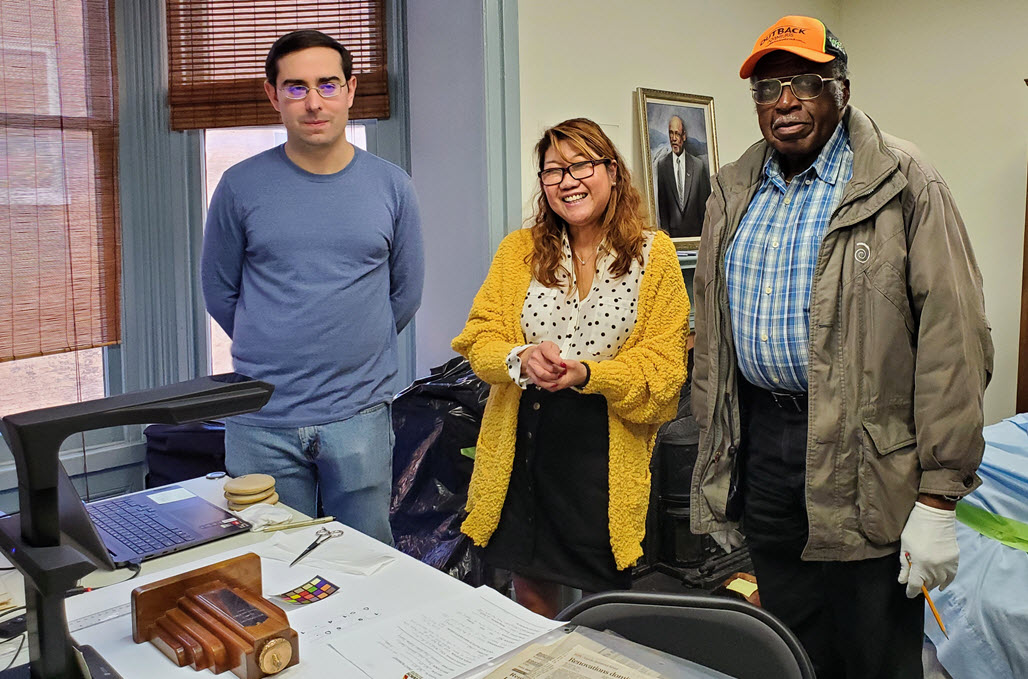
Meet Our New Collections Manager
January 28, 2023We are thrilled to welcome Leone Cahill-Krout as AARCH Society’s first Collections Manager. In this part-time, grant-funded role, Leone is establishing policies for archive management and organizing and curating items from the AARCH Society archive, including those that will be used in the Frederick African American Heritage Center. Leone, who graduated from Northwestern University with a degree in museum studies and manage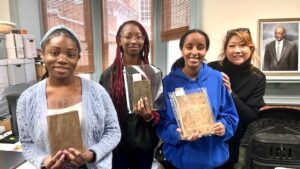 ment, joins us from her most recent position with Old Swedes Historic Site in Wilmington, Del. “As Executive Director of Old Swedes, I had the opportunity to reexamine and apply conservation and curatorial principles to their museum collection dating to the early 17th century. It was the highlight of my tenure,” Leone says. “I look forward to working with the Collections Committee and being part of AARCH Society’s next chapter and much-anticipated opening of the new Heritage Center.” On a recent Saturday in January, Leone was able to share her experience with an excited group of high school students who got first-hand experience in museum preservation through our partnership with Frederick County Public Schools. The students are volunteering with our Collections Committee, learning basics of how to organize and preserve archival documents.
ment, joins us from her most recent position with Old Swedes Historic Site in Wilmington, Del. “As Executive Director of Old Swedes, I had the opportunity to reexamine and apply conservation and curatorial principles to their museum collection dating to the early 17th century. It was the highlight of my tenure,” Leone says. “I look forward to working with the Collections Committee and being part of AARCH Society’s next chapter and much-anticipated opening of the new Heritage Center.” On a recent Saturday in January, Leone was able to share her experience with an excited group of high school students who got first-hand experience in museum preservation through our partnership with Frederick County Public Schools. The students are volunteering with our Collections Committee, learning basics of how to organize and preserve archival documents.
Top photo: Leone Cahill-Krout, center, is pictured at AARCH Society’s Federated Charities office with left, Scott Keefer, Collections volunteer, and Seaven Gordon, AARCH Society Vice President. Bottom photo: Jordin White and Ocoee-Rose McCaskill from Oakdale High School and Leila Gibril, Linganore High School, and Leone.

New Grants for AARCH Society
January 18, 2023AARCH Society is honored to announce the following new grants that have been received by our organization for 2023.
- In December, the Maryland Heritage Areas Authority Financing Fund awarded a $35,000 grant. Frederick County will partner with AARCH Society to create an African American Historic Context Study of Frederick County. This work will expand on the completed Phase I, which involved a context statement and survey of Black resources in northern Frederick County. The proposed project will focus on identifying and researching historic and cultural themes to create a more comprehensive picture of the African American experience in Frederick County.
- Also in December, Ausherman Family Foundation awarded AARCH Society $3,000 for the production of a documentary of Greenmount Cemetery, an African American cemetery that was located at the current site of Frederick Health.
- In November, Maryland Humanities awarded AARCH Society a $10,000 SHINE grant for our work spotlighting the culture and history of Frederick County African Americans.
- Also in November, FirstEnergy Foundation awarded AARCH Society $3,000 to support programming.

Amaze Design Selected for Heritage Center
August 18, 2022AARCH Society is excited to announce another step forward in the Heritage Center Vision: after reviewing several proposals for exhibit planning and design, the Society’s evaluation team recommended the selection of Amaze Design of Boston, Mass. In July, the AARCH Society Board voted to affirm.
“The Amaze Design team has a proven track record of producing extraordinary presentations that will serve us well,” says AARCH Society President Protean Gibril. “Their organization includes a talented team, and their proposal provided examples that we feel will create an exciting experience to provoke and “wow” Heritage Center visitors.”
Amaze Design has experience designing for a wide range of audiences nationally and internationally, with a client list that includes the National Park Service’s African Burial Ground in New York City, the August Wilson African American Culture Center in Pittsburgh, the Smithsonian National Museum of African American Culture, the Tubman Museum in Macon, Ga., and the National Children’s Museum in Washington, D.C.
On August 18, Amaze Design’s Scott Rabiet will be in Frederick to see the Heritage Center site and tour the downtown area and Frederick Visitor Center with members of the AARCH Society Board.
The dream of establishing a permanent home for the African American Resources Cultural and Heritage Society (AARCH) is nearing fruition, with the goal of opening The AARCH Society Heritage Center in 2023.
Two decades in the making, it fulfills former Alderman William O. Lee’s vision. The new Heritage Center will be a vibrant place to tell the important and under-represented story of Frederick’s African American community.
The City of Frederick provided a lease for a 3,200-square-foot facility on the corner of Carroll and All Saint’s Streets. Ideally situated near the Frederick Visitor Center, the Delaplaine Arts Center, and the Sky Stage, the AARCH Society Heritage Center adds another prominent destination for heritage tourism.
The Heritage Center will include permanent exhibit space, a multi-purpose area suitable for theater/meeting space, and research and archival facilities. It will showcase local artifacts and feature first-hand accounts of Frederick’s living treasures, local African American residents 90 years old or older.

$50,000 State Grant & Community Support
August 7, 2022In July, AARCH Society received a $50,000 grant from the Maryland Heritage Areas Authority, which will help support exhibit design for the planned African American Heritage Center. The grants are for heritage tourism projects and activities in the state.
exhibit design for the planned African American Heritage Center. The grants are for heritage tourism projects and activities in the state.
“Our administration is proud that this funding will allow for 107 projects to move forward and congratulate Maryland’s Heritage Areas and their tourism partners for their support in changing Maryland for the better,” said Maryland Governor Larry Hogan.
AARCH Society is also extremely grateful for the ongoing support of the Frederick community, which continues to embrace our Mission and our goal to open the Frederick African American Heritage Center in 2023.
embrace our Mission and our goal to open the Frederick African American Heritage Center in 2023.
In June, the Community Service Fund of Evangelical Reformed United Church of Christ awarded a $1,000 unrestricted grant to AARCH Society through the Community Foundation of Frederick County. That same month, The Isaiah Charles Brown Memorial Fund donated $500 in unrestricted funds to AARCH Society through the Community Foundation of Frederick County. This gift, made at the recommendation of Dr. Denise Rollins, as well as the Evangelical Reformed Church gift, will be utilized for operating and program costs at AARCH Society.
In July, the Unitarian Universalist Congregation of Frederick (UUCF) chose AARCH Society as the recipient of its split- plate program, which donates half of a service’s collections to a local non-profit organization. AARCH Society President Protean Gibril presented to UUCF members earlier in the month. “We look forward to strengthening congregational support for the AARCH Society’s mission and working toward a community with justice for all,” said UCC member Carol Antoniewicz.
plate program, which donates half of a service’s collections to a local non-profit organization. AARCH Society President Protean Gibril presented to UUCF members earlier in the month. “We look forward to strengthening congregational support for the AARCH Society’s mission and working toward a community with justice for all,” said UCC member Carol Antoniewicz.
AARCH Society is grateful for this community support and partnership and has a special note of thanks for UUCF member Joe Ginorio, who composed a song in honor of AARCH Society: Listen to “Freedom Rings” here.

Juneteenth 2022: Message from Our President
June 19, 2022As we celebrate the second national observance of the Juneteenth holiday, America’s second Independence Day, we celebrate in spirit with the 250,000 plus formally enslaved African-Americans in Galveston, Tex., when their freedom was declared in the Emancipation Proclamation on June 19,1865.
The legacy of Juneteenth is the history and the story of the strength and resiliency of Black Americans who refused to give up during the most painful period in American history when they were torn from their lives in Africa to endure centuries of enslavement in the Americas.
Remembering, preserving, and celebrating these stories of resiliency is what makes the mission of the African American Resources and Cultural Heritage (AARCH) Society so pertinent and relevant today. We recognize that June 19th, 1865 marked the beginning of a journey that promised to lead to freedom, equality, and justice for formerly enslaved Americans. We know that the journey continues. Though progress has been made, 157 years later, we still have much work ahead to realize the full promise of emancipation and equality.
As the Society moves closer to opening its African American Heritage Center in 2023, where the often-omitted stories of African Americans in Frederick County, Md., will be recognized, presented, and celebrated, we take the banner from the ancestors whose day of emancipation we celebrate on Juneteenth.
We thank the community for its support as we make progress toward realizing the vision of William O. Lee Jr. and David V. Key, are now among the ancestors. We are grateful for a Board of Directors, funders, volunteers, and members who believe in and support our mission and the vision for the future. We encourage everyone to learn about the history of Juneteenth and to find ways not just to celebrate emancipation day but to continue to find ways to effect positive change in their communities and in the world.
Protean Gibril, President
AARCH Society Board of Directors
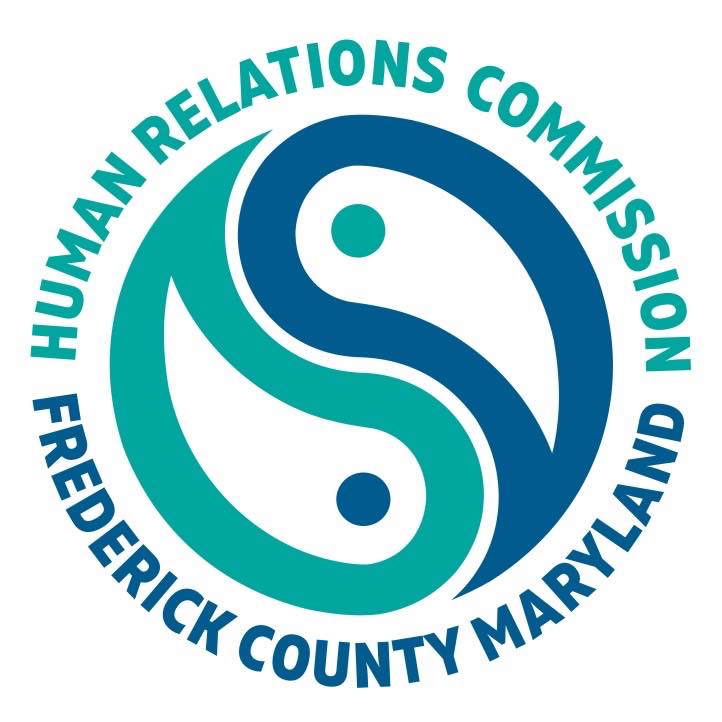
Human Relations Commission Honors AARCH Society
June 8, 2022On May 26, AARCH Society was honored to receive the 2022 Lord D. Nickens Community Service Award from the Human Relations Commission of Frederick County and thrilled that AARCH Society Board Member Rose Dorsey Chaney earned the Theodore W. Stephens Lifetime Achievement Award.
Ms. Chaney is a founding member of AARCH Society and a driving force in our growth and ongoing success. In 2021 Ms. Chaney was named a Wertheimer Fellow for Excellence in Volunteerism by the Community Foundation of Frederick County.
Michael Hughes, Chief Equity and Inclusion Officer for Frederick County, presented the keynote address at the ceremony, which was held virtually.
The Lord D. Nickens Community Service Award is given to an individual or organization (school, business, non-profit agency, etc.) in Frederick County that has shown a strong commitment and compiled a solid record of achievement in promoting justice, tolerance, affirmative action, cultural diversity, and inclusion in the community at large.
AARCH Society was noted for our planned establishment of Frederick’s African American Heritage Center on the corner of All Saints and Carroll streets in 2023 and “… its programs, services, and activities, its research, archival and cultural materials, objects and collections and … support of a dedicated and hard-working corps of volunteers … shar[ing] the stories about the history, the contributions and extraordinary resiliency of African Americans in Frederick County despite the challenges they faced during slavery, the Jim Crow era and beyond.”
The Theodore W. Stephens Lifetime Achievement Award is given to an individual with at least 10 years of active involvement in community services in Frederick County and a record of outstanding contributions over the course of time.
At the award ceremony, Ms. Chaney was lifted up for her longstanding and wide-ranging dedication to community service. “For several years, she has spearheaded the task of creating and emailing a weekly African American Community Calendar that promotes local events. You can also find her periodically emailing job postings and other announcements that she’s gathered from various sources. The list of contributions reaches far and wide and ranges in varying degrees,” the Human Relations Commission noted in their introduction.
AARCH Society congratulates Miss Rose for this well-deserved recognition and expresses our deep appreciation to the Human Relations Commission for the awards acknowledging the work being done by AARCH Society and our members on behalf of Frederick County.